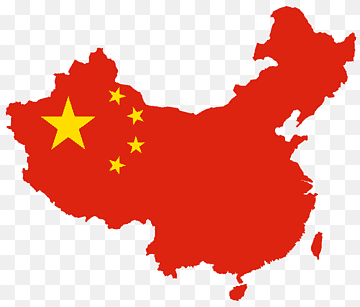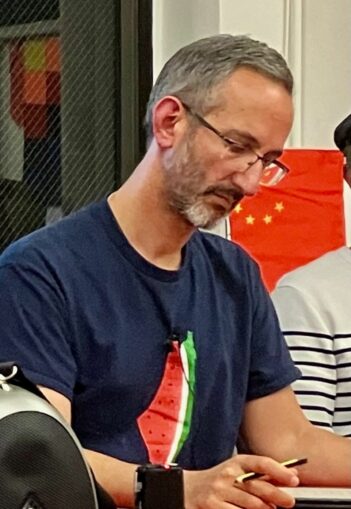

By Carlos Martinez
Martinez is a co-editor of Friends of Socialist China. His book, “The East Is Still Red – Chinese Socialism in the 21st Century,” was published in 2023 by Praxis Press and reviewed in Workers World newspaper. (workers.org/2023/07/72231/) The following article, which WW publishes with the author’s permission, was originally posted on socialistchina.org on Nov. 15, 2024.


Carlos Martinez at Oct. 24, 2024, book launch in New York City. WWPhoto: Saher Al-Khamash
Although the Pivot to Asia was initiated by the Barack Obama administration — when then-Secretary of State Hillary Clinton was tasked with developing a strategy for “America’s Pacific Century” — it was the Donald Trump presidency from 2017-21 that really turned up the dial in terms of U.S. anti-China hostility.
Trump campaigned in 2016 on a promise to protect jobs by addressing the U.S.’s trade deficit with China: “We can’t continue to allow China to rape our country, and that’s what they’re doing. It’s the greatest theft in the history of the world.”
In power, the Trump administration launched a full-scale trade war, imposing enormous tariffs on hundreds of billions of dollars of Chinese imports. This was combined with a systematic attack on Chinese technology companies, removing Huawei from U.S. telecoms infrastructure and attempting to prevent TikTok and WeChat from operating in the U.S.
Militarily, Trump ramped up the U.S.’s presence in the South China Sea and sought to revitalize the Quad group (U.S., Japan, India and Australia), working towards a broad regional alliance against China.
The State Department oversaw a crackdown on Chinese students and researchers, and, with the arrival of the Covid-19 pandemic, Trump resorted to flagrant racism, talking repeatedly about the “kung flu” and the “China virus” — all of which fed into a horrifying rise in hate crimes against people of East Asian descent.
As such, many breathed a sigh of relief when Joe Biden was elected president four years ago. Unfortunately, however, Biden has essentially maintained the anti-China strategic orientation of his predecessor, albeit without the crassly confrontational rhetoric and overt racism. Biden in many ways has been more systematic in pursuit of military and economic containment of China, particularly when it comes to building an international coalition around U.S. strategic interests.
Map of China
AUKUS aims at China
In September 2021, the U.S., Britain and Australia announced the launch of AUKUS — a nuclear pact, manifestly contravening the Non-Proliferation Treaty and evidently designed to counter China.
Biden has hosted numerous Quad summit meetings, at which the member states have reiterated their “steadfast commitment to a free and open Indo-Pacific” — that is, to preserving a status quo in which the U.S. maintains over 300 military bases in the region, along with tens of thousands of troops, nuclear-enabled warplanes, aircraft carriers and missile defense systems aimed at establishing nuclear first-strike capability.
The combination of the Quad and AUKUS looks suspiciously like an attempt to create an Asian NATO. Meanwhile [then-Democratic Speaker of the House] Nancy Pelosi’s 2022 trip to Taiwan Province was the highest-level U.S. visit to the island in a quarter of a century.
In 2023, Biden signed off on direct U.S. military aid to Taiwan for the first time. A BBC headline from November 2023 noted that “the U.S. is quietly arming Taiwan to the teeth.” This undermines the Three Joint Communiqués — which form the bedrock for U.S.-China diplomatic relations — and is clearly aimed at inflaming tensions across the Taiwan Strait and setting up a potential hot war with China over Taiwan.
A recently-leaked memo from four-star General Mike Minihan predicted war over Taiwan in 2025, “My gut tells me we will fight in 2025.” (Air Force Times, Jan. 31, 2023)
The Biden administration has expanded Trump-era restrictions against China’s technology industry, in particular by launching a “chip war” to slow down China’s progress in semiconductor production, artificial intelligence, mobile phones and more. And while the U.S. government under Biden has set several ambitious climate goals, it has also introduced sweeping sanctions on Chinese solar materials and imposed huge tariffs on Chinese electric vehicles.
The unfortunate truth is that there is a consensus among Democrats and Republicans. In Biden’s words, “We’re in a competition with China to win the 21st century” — and the U.S. must win this competition at all costs.
Economic clash seems likely
To what extent can we expect the situation to change under a second Trump presidency? A deepening of economic confrontation seems more than likely. Trump has already threatened 60% tariffs on goods from China — a significant escalation from his last trade war, when duties reached a high of 25%..
Meanwhile he has suggested “a 100% or maybe even a 200% tariff” on Chinese carmakers. (Sinju Post, Oct. 12) While the U.S. and China have made some progress working together on environmental issues in the last year, this will presumably be wiped out, given Trump’s disdain both for cooperation with China and for climate action.
In terms of military strategy, the picture is less clear. His rhetoric opposing the U.S.’s “forever wars” likely helped his campaign, but its promise may well not be realized given the increasingly loud war drums beating in Washington.
Inasmuch as Donald Trump has a coherent analysis of international relations, he is perhaps closest to the “realist” concept that the U.S. should make an ally out of Russia in order to prepare for confrontation with China. That ship has of course sailed, with Russia-China relations at their highest point since the 1950s, but nonetheless the U.S. will likely shift emphasis and resources away from Russia and towards China.
The appointment of inveterate China hawks Sen. Marco Rubio as secretary of state and Rep. Michael Waltz as national security adviser sends a clear signal that Trump is planning to escalate hostilities. Rubio is an anti-China fanatic, who stands for more tariffs, more sanctions, more slander, more support for Taiwanese separatism, more provocations in the South China Sea and more destabilization in Hong Kong and Xinjiang. Waltz has long pushed for closer military cooperation with India, Japan, Australia and other countries in the region in preparation for war against China.
In his message of congratulations on Trump’s election, Chinese President Xi Jinping opined, “A China-U.S. relationship with stable, healthy and sustainable development serves the common interests of the two countries and meets the expectations of the international community.” (People’s Daily Online, Nov. 8) This pithily summarizes China’s offer to the West: Let’s work together to tackle the urgent issues facing humanity, including climate change, pandemics, peace, nuclear proliferation, food security and development.
Accepting such an offer would mean a drastic change of path for the U.S. and its allies, including Britain which, under Prime Minister Keir Starmer as much as Prime Minister Rishi Sunak, hews perilously close to U.S. positions. It would mean accepting humanity’s trajectory towards a multipolar future; it would mean prioritizing the planet and its people over hegemonic ambitions; it would mean giving up on the Project for a New American Century. Imperialist ruling classes will not walk that road of their own accord. Mass movements must force them to do so. [Sunak, in the Conservative Party, was PM October 2022 to July 2024; Starmer, in the Labor Party, is the current PM.]
North Philly Peace Park gathering After a federal court hearing on an anti-immigration bill early…
Supporters of Palestine in Hoboken, New Jersey, were outraged when they found out that the…
Philadelphia Friends, family, fellow union members and community activists gathered at the Octavius Catto statue…
The Trump regime’s decision to lift sanctions on Syria exposes the true purpose of sanctions:…
Download the PDF Black and white version Nakba Day action hits Citibank Blue Bottle baristas…
Protesters rallied and marched on May 10 in Bay Ridge, Brooklyn, in commemoration of the…